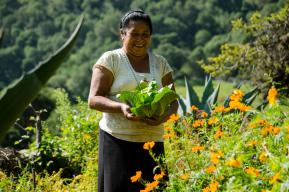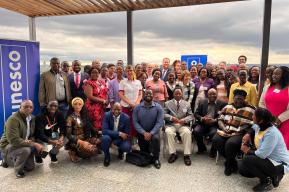News
Towards an Inclusive Educational Future: The Regional Framework Law will Transform Education in Central America, the Caribbean Basin, and Mexico

Representatives from the Forum of Presidents and Presidents of Legislative Powers of Central America, the Caribbean Basin, and Mexico (FOPREL) gathered today to present the initiative: the "Special Regional Framework Law for the promotion, prioritization, and protection of the Right to Education."
This law, developed and supported in collaboration with key stakeholders such as Save the Children, the Central American Educational and Cultural Coordination of the SICA (CECC-SICA), and UNESCO, aims to provide legislative bodies with guidance to develop normative instruments that reinforce countries' commitments and capacities to ensure the right to inclusive, equitable, and quality education for all citizens of the region, especially those in vulnerable situations.
This framework law could also help harmonize legislative frameworks concerning education and promote national and sub-regional dialogues to reconsider the purposes, content, and pedagogies of education in the context of a discussion on post-COVID-19 development models, in order to respond to a changing world.
Throughout its articles, the law emphasizes the importance of equipping individuals throughout their lives with the skills that enable them to lead dignified lives, have decent work, actively participate in transforming their communities and countries, be agents of action in addressing climate change, and develop resilience in the face of emergencies and humanitarian crises.
The law also seeks to prioritize thematic areas in the educational policies' agenda, which act as constraints on access to education and educational attainment, particularly for populations in vulnerable situations. These areas require complementary equity and inclusion policies, such as food security, prevention of educational exclusion, creating healthy, safe, and peaceful learning environments, bilingual intercultural education, among others. It also emphasizes educational innovation through increased integration of ICTs in teaching and learning processes, strengthening flexible teaching modalities, curriculum updates, and more.
The law highlights the role of teachers in achieving these objectives and calls for strengthening their professional development, including access to quality training opportunities and participation in decision-making processes that affect their profession. It also dedicates a central chapter to the protection and increase of educational financing, budgeting and results-based management, and the need for intersectoral and multisectoral partnerships to bring about educational transformation that allows greater access and quality in this right.
Ariel Alvarado, Executive Secretary of FOPREL, Clarita Pech, a member of the Consultative Council from the National Assembly of Belize, Valerie Woods, President of the Inter-parliamentary Commission on Education and Health of FOPREL, and Isis Cuellar, a member of the National Congress of Honduras, participated in the event.
Representatives from expert organizations that collaborated in the elaboration of the framework law were also present, including Alexander Leicht, Director of the UNESCO Regional Multisectoral Office in San José, Roberto Suárez, Executive Secretary of CECC/SICA, Raquel Núñez, Strategic Coordinator at CECC/SICA, and Victoria Ward, Regional Director for Latin America and the Caribbean at Save the Children.
The Special Regional Framework Law enshrines a comprehensive conception of the right to education, aligned with the Sustainable Development Goals. This project aims to guarantee lifelong access and ensure relevant and quality learning that empowers individuals. The law places people at the center, promoting equity, social justice, diversity, and gender equality.
This initiative is considered a crucial step towards quality and equitable education in Central America and the Caribbean. Coordinated efforts between parliaments, international institutions, and civil society have the potential to transform the educational landscape in the region and provide future generations with the necessary tools to build a prosperous and sustainable future.
Background:
During the XXV Extraordinary Meeting, the Honorable Presidents of the Legislative Powers that form part of FOPREL approved the "Report on the Legislative Framework in Education in Central America, the Caribbean Basin, and Mexico," serving as the basis for the elaboration of the "Special Regional Framework Law for the promotion, prioritization, and protection of the Right to Education."
Subsequently, during the XXXIV Meeting of the Council of Ministers of Education of CECC/SICA in 2022, the inter-institutional coordination committee for education presented an advance of the proposal for the "Special Regional Framework Law for the promotion, prioritization, and protection of the Right to Education." The proposal was well received, and instructions were given to follow up on it with the initiative.
Share
About the authors










